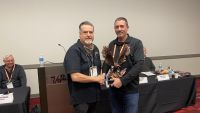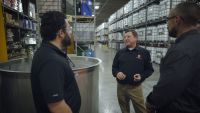Contractor to Contractor: Sun Valley Masonry, Inc.
By Masonry
Ken Nessler - Sun Valley Masonry, Inc., Phoenix, AZ
Sun Valley Masonry, Inc., (SVM), owned by Robert Baum and Ken Nessler, has been a strong force in the Southwest masonry community since its beginning in 1978. This position has been achieved through not only good work ethics and quality craftsmanship, but also by maintaining a full-time Safety Director, initiating a marketing program, and staying active in industry associations, all the way from the local to national level. This work has paid off by creating a sound and well-respected business, but also by generating awards for craftsmanship and leadership. Ken Nessler was kind enough to talk with us more about Sun Valley and the industry as a whole.
Masonry: What has been the key to Sun Valley's growth and success over the years?
Nessler: People, people, people. With a company as large as ours, we have to be able to delegate responsibilities. That means we are only as good as the people who work for us. Sixty-five percent of our bids are labor. That is a large variable to deal with, and it requires top production.
Robert Baum (President) and myself are active owners. Robert's main focus has always been hands-on with the field employees; my focus has always been centered on the estimating and contracting portion of the business. We start by showing a good work ethic and set an example for our employees to follow.
Masonry: SVM has been the recipient of dozens of industry and business awards, most recently two award-winning projects in the Arizona Masonry Guild's Excellence in Masonry. Tell us more about these two projects, and what made them stand out for recognition.
Nessler: The awards are actually architectural awards given for various reasons. The judges are always from another state and consist of architects and mason contractors. It is left completely up to them as to the type of award to be given. Our participation is awarded due to the quality of work. Regardless of how architecturally pleasing a project is, it won't receive an award if the workmanship doesn't meet the required standard of quality.
Masonry: Sun Valley Masonry is the only mason contractor in Arizona with a full-time Safety Director on staff. How has this position paid for itself?
Nessler: Three scaffold violations for the same occurrence is considered serious, and fines are issued accordingly. OSHA does not differentiate between the number of employees the contractor has on his payroll; therefore, we have a lot more exposure than smaller contractors. There are other times when OSHA erroneously issues a citation. It takes time to research and get it turned around. A Safety Director has dedicated time to deal with these and other problems. Having a Safety Director also makes us a safer company, which is reflected in our insurance rates.
Masonry: Not only have several Sun Valley employees held positions in industry associations, but you've also received "Industry Leader of the Year" from Masonry Construction in 2001 and the 2003 Bart Del Duca Award for lifetime dedication to the masonry industry presented by the Arizona Masonry Guild. How have these accomplishments helped your business, as well as your industry?
Nessler: There are certainly a lot of leaders in our industry, and I am certainly not a better leader than Robert. Everything we have accomplished, we accomplished together. I was probably singled out for the award because I was more of a front man getting work and more recognizable because of my position dealing with publications and promotions. I have had a lifetime of dedication to the masonry industry. We have always believed we should give back to the industry that supports our livelihoods, and we highly encourage all of our personnel to do their part.
It was unexpected but nice to be recognized by the Arizona Masonry Guild's Lifetime Dedication to the Industry Award. I think being recognized by the industry helps others to excel who want to give back to the industry.
Masonry: SVM has a very impressive web site, which not only includes information on your own business, but industry links as well. How has this site promoted your business, and was it worth the time and expense?
Nessler: The time and expense of the web site is minimal compared to the benefits. General contractors, whose jobs are more trade management, can easily move around the country bidding different projects. Our web site lets them know who we are and what they can expect from us when they come to our area.
Masonry: Your web site states that SVM enjoys a long-standing reputation as a cooperative partner with owners, architects and contractors. How have you come to achieve this?
Nessler: Many jobs are built under the method where the general contractor stands at risk with a price not to exceed. Our past track record has shown that we always complete jobs on schedule for the amount of our contract. Many owners, architects and contractors look to us for budgeting and scheduling during the design development stage of the drawings. Sun Valley absorbs that cost. We feel the owners are better off with realistic budgets and schedules. That effort and one-on-one relationship is very valuable when negotiating a contract.
Masonry: What do you feel is the biggest misconception about the masonry industry?
Nessler: I believe the largest misconception is that masonry is overpriced and not a good buy when you compare it to other materials.
Masonry: What would you do to change that misconception?
Nessler: It has to start with the developer, owner and architect. Arizona has a very active promotional program through the Arizona Masonry Guild that continually educates the building community about the benefits of masonry. We have always been generous with our time and an active financial contributor to the Guild.
Masonry: What do you feel is the industry's biggest challenge in the near future?
Nessler: Educating a workforce that doesn't mind hard work. Years ago, all training was done through a union apprenticeship-training course that was funded from hourly contributions from the contractors. The downward trend of union contractors has left a void where funding is needed for education. There has to be a means for both open-shop and union contractors to equally contribute money toward education.
Masonry: Where do you think the masonry industry is going to be 10 years from now?
Nessler: I see fewer and fewer contractors today who are interested in keeping the industry alive for their sons and daughters. I believe the Eastern and Midwestern states still have generous promotional and educational funds. That's not the case in the West. New Mexico has no promotional program whatsoever. In some cases, they are building schools and commercial buildings with studs because no one has taken an interest in promoting the industry. That has a residual effect on Arizona and its industry efforts. The growth areas are no longer in the East and Midwest. The growth areas are in the Southwest. The masonry work will follow the flow of people because they create the demand. If a lack of educated employees continues and the lack of interest promoting our industry from those that are living for today continues, masonry will disappear.
A good example of that is pre-1979 in Arizona. Close to 100% of home construction in Arizona was masonry. The Arizona Masonry Guild always assumed that homes would be built with masonry forever. Little if any money was put toward residential masonry promotions. The union mason went on strike, and developers immediately turned their track homes to wood studs. The entire industry was caught by surprise. We have been trying to recapture that market for 25 years. Seldom do you see masonry homes in Arizona anymore. Today, only about half the fireplaces are masonry. Once it's gone, it can't be recovered.
Masonry: What do you feel are the most critical issues you'll face with future government regulations?
Nessler: There isn't any way the labor pool in the United States can compete with the labor pool in Third World countries. That's where the manual labor jobs are going. Without labor there will not be a need for factories and office buildings we build today. I am not a proponent of restrictive trade agreements ? this is a world economy now ? however, something has to be done to preserve jobs in this country. Without jobs, the tax base will be depleted. Depleting the tax base will have an impact on schools, prisons and other public buildings we are building. We need to find nonrestrictive legislation to solve this problem.
Masonry: Which group do you feel has the bigger impact on masonry's future: architects, engineers or general contractors?
Nessler: I have seen general contractors engineer masonry out of projects to be replaced with their self-performed concrete. I have also experienced general contractors value engineering masonry walls to steel studs and wood. Most architects and engineers in Arizona prefer masonry. If a project is over budget, masonry always seems to be the first thing to go with value engineering. That is almost always done at the general contracting level.
Masonry: What do you like most about being a member of MCAA?
Nessler: I believe the Mason Contractors Association of America is currently the only national organization attempting to pull all mason contractors' problems together under on unified hat. It also provides a foundation for mason contractors from all over the country to meet and address problems. We will always support the national Mason Contractors Association of America, and I will encourage others to do the same. We contractors are the industry. It will only be as good as we make it.
About the Author
Masonry, the official publication of the Mason Contractors Association of America, covers every aspect of the mason contractor profession - equipment and techniques, building codes and standards, business planning, promoting your business, legal issues and more. Read or subscribe to Masonry magazine at www.masonrymagazine.com.


















